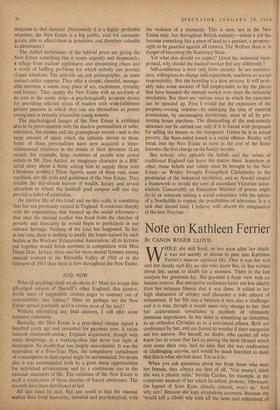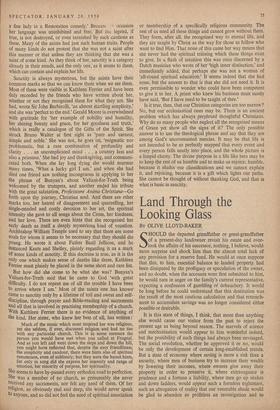Note on Kathleen Ferrier
BY CANON ROGER LLOYD WRILE she still lived, or too soon after her death, it was not seemly or decent to peer into Kathleen Ferrier's interior spiritual life. That it was her real and her deeply ,rich life no one who knew her, or has written about her; seems to doubt for a moment. There in the last analysis her greatness lay. She guarded it from view with an intense reserve. But perceptive audiences knew not less clearly than her intimate friends that it was there. It added to her high distinction of artistry and character a note almost of uniqueness. if her life was a benison it was also a challenge. and it is true, though it would seem very strange to her, that her achievement constitutes a problem of ultimately immense importance. In her there is something as disturbing to an orthodox Christian as to a convinced atheist. Both are confronted by her, and are forced to wonder if their categories are too narrow. She herself, no doubt, who caused all who knew her to count that fact as among the most blessed which ever came their way, had no idea that she was confronting or challenging anyone, and would be much horrified to think that this is what she had done. Yet so it is.
When you ask questions about her from those who were her friends, they always say first of all. 'You mustn't think she was a plaster saint.' Neville Cardus, for example, in the composite memoir of her which he edited, protests, 'Obviously the legend of Saint Kate, already created, won't do.' And why not? Because she kept scrupulous accounts. Because she `would tell a ribald tale with all the taste, and refinement of a fine lady in a Restoration comedy.' Becaust occasion her language was uninhibited and free. But the legend, if true, is not destroyed, or even tarnished by such cautions as these. Many of the saints had just such human traits. People of many kinds do not protest that she was not a saint after this manner or that unless they are thinking that she was a saint of some kind. As they think of her, sanctity is a category already in their minds, and the only one, as it seems to them, which can contain and explain her life.
Sanctity is always mysterious, but the saints have their common marks so that we can know them when we see them. Most of these were visible in Kathleen Ferrier and have been duly recorded by the friends who have written about her, whether or not they recognised them for what they are. She had, wrote Sir John Barbirolli, 'an almost startling simplicity,' and she was 'perfect to the end.' Gerald Moore is overwhelmed with gratitude for 'her example of nobility and humility, her shining beauty and grace, for her goodness and truth,' which is really a catalogue of the Gifts of the Spirit. She struck Bruno Walter at first sight as 'pure and earnest, simple and noble.' She was not, he goes on, 'enigmatic nor problematic, but a rare combination of profundity and clarity . . . an uncomplicated mind . . . a country lass and also a priestess.' She had joy and thanksgiving, and communi- cated both. When she lay long dying she would murmur many times, 'What a lucky girl I am,' and when she had 'died one friend saw nothing incongruous in applying to her the phrase of Bunyan's about Valiant-for-Truth being welcomed by the trumpets, and another encjed his tribute with the great salutation, Proficiscere Anima Christiana—Go forih upon thy journey, Christian soul. And there are other marks too, her hatred of disagreement and quarrelling, her single-minded and costly devotion to her art, the spiritual intensity she gave to all songs about the Cross, her kindness, and her love. There are even hints that she recognised her early death as itself a deeply mysterious kind of vocation. Archbishop William Temple used to say that there are some souls for whom it seems to be necessary that they should die Young. He wrote it about Father Basil Jellicoe, and he instanced Keats and Shelley, plainly regarding it as a mark of some kinds of sanctity. If this doctrine is true, as it is the Only one which makes sense of deaths like these, Kathleen Ferrier must plainly be placed in the same short and rare list.
But how did she come to be what she was? Bunyan's Valiant-for-Truth said that he came to God 'with great difficulty. I do not repent me of all the trouble I have been to arrive where I am.' Most of the saints one has known' Came to sanctity only by a lifetime of toil and sweat and self- discipline, through prayer and, Bible-reading and sacraments and all that is involved in practising membership of a church. With Kathleen Ferrier there is no evidence of anything of the kind. Her sister, who knew her best of all, has written: Much of the music which most inspired her was religious, yet she seldom, if ever, discussed religion and had no ties with any particular church. This is in some measure the person you would have met when you called at Frognal. And as you left and went down the steps and down the hill, you might have reflected that, despite the easy friendliness, the simplicity and candour, there were hints also of spiritual remoteness, even of sublimity; but they were the barest hints, for only in song did she express her intensity and range of emotion, her sincerity of purpose, her spirituality. She seems to have by-passed every orthodox road to perfection. She was a member of no church, so presumably she never received any sacraments, nor felt any need of them. Of her religion, so obviously real and deep, she would never speak to anyone, and so did not feel the need of spiritual association or membership of a specifically religious community. The rest of us need all these things and cannot grow without them. They form, after all, the recognised way to eternal life, and they are taught by Christ as the way for those to follow who want to find Him. That none of this came her way means that she never had the spiritual training which these things exist to give. In a flash of intuition this was once discerned by a Dutch musician who wrote of her 'high inner distinction,' and immediately added, that perhaps she was not a woman of `all-round spiritual education.' It seems indeed that she had none, but the answer to that is that she did not need it. It is even permissible to wonder who could have been competent to give it to her. A priest who knew his business must surely have said, 'But I have need to be taught of thee.'
Is it true, then, that our Christian categories are too narrow? No, but our ecclesiastical ones may be. There is an ancient problem which has always perplexed thoughtful Christians. Why do so many people who neglect all the recognised means of Grace yet show all the signs of it? The only possible answer is to use the theological phrase and say that they are among God's uncovenanted mercies. It may be that life is not intended to be so perfectly mapped that every event and every person falls neatly into place, and the whole picture is a limpid clarity. The divine purpose in a life like hers may be to keep the rest of us humble and to make us rejoice; humble, because it eludes our classifications and we cannot explain it, and rejoicing, because it is a gift which lights our paths. She cannot be thought of without thanking God, and that is what is basic in sanctity.



































 Previous page
Previous page